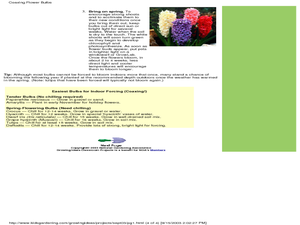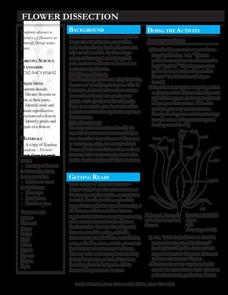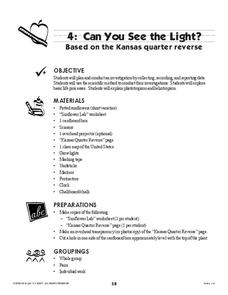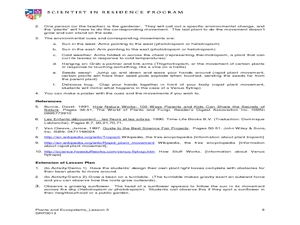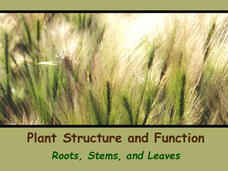Casimir Middle School
Biological Classification Worksheet
Classify living things with a set of worksheets that has pupils sorting and indentifying living and non-living things. Learners use the worksheets as a basis for finding their answers.
Curated OER
Coaxing Flower Bulbs
Young scholars complete an experiment for coaxing flower bulbs into growth. In this flower growth lesson plan, students research various types of flower bulbs that may be used to complete a coaxing experiment. Young scholars then...
Curated OER
Flowers and Their Life Cycles
First-time florists will be able to label the structures of simple and composite flowers after reading this handout and answering the comprehension questions. There are a couple of grammatical errors in the text, but the content is...
Curated OER
Edible and Medicinal Plants: Field Trip Guide
Though it's designed to guide a field trip to the New York Botanical Garden, you could take resource like this one to a local park, wilderness area, school garden, or even a weedy empty lot. Middle schoolers identify plant parts and...
Biology Junction
Seed Plants: Gymnosperms and Angiosperms
One of the reasons plants found success on land relates to seed development. Scholars learn about many different forms of seeds and how they changed over time. It describes the structure and function of many different types of seeds in...
Curated OER
Plant Parts and their Function
Discover why plants are important to our world. View plant parts and categorize them as stems or buds. Students do a cut and paste of pictures of plants into correct categories. Students also plant a carrot top,and record the growth and...
Curated OER
Flower Dissection
Beginning biologists pull a flower apart and familiarize themselves with the different reproductive structures. Why have them learn only from just a book or diagram when they can examine real samples? There is no link to the referenced...
The Science Spot
Flower Basics
Learn about plants and pollination with a learning exercise about the parts of a flower. After labeling the anatomy of a flower using a word bank, kids explain the difference between self-pollination and cross-pollination, and unscramble...
Curated OER
Introduction to Plant Reproduction
Eight objectives pertaining to plant reproduction are stated and addressed in this presentation. Objectives include defining sexual and asexual reproduction, comparing monocots to dicots, explaining flower types, and more. Some of the...
Curated OER
Can You See the Light?
Explore plants and flowers with this lesson. Learners talk about plants, conduct an experiment with suflowers, and track a plants growth. This is a motivating way to present this concept.
Curated OER
Flowers and Plants
Students are assigned to bring five flowers. They explore flowers to distinguish different physical features of flowers. They compare and contrast different flowers to determine what features they have in common. Students develop an...
Curated OER
Review of Plants
In this plant science worksheet, students complete 45 multiple choice questions on plant reproduction and different plants of a plant.
Curated OER
Plants Alive! How Plants Grow and Move
Students explore how plants move in response to the environment. In this plant lesson, students engage in three different experiments to investigate how plants grow and move. Resources available in English and French.
Howard Hughes Medical Institute
Seed Dispersal in Tropical Forests
How do seeds get around? It's not like plants can control seed dispersal—or can they? Dig deeper into the amazing mechanisms of seed dispersal observed in tropical plants through interactives, a video, and plenty of hands-on data...
Curated OER
Plants
One slide reviews the main plant parts and most of the remaining slides address seven plant processes of life. This is a different approach to introducing the life of a plant. Three tasks are assigned to viewers on the last slide, making...
Curated OER
Water Plants
Students examine the plants and animals that make their home in wetlands. While observing, they make sketches of the ones they see with a pencil. To end the lesson, they use watercolors to paint their flowers and animals at the local...
Cornell University
Weed IPM
Go on a weed hunt! Scholars gain insight into the characteristics of plants and examine the outdoor environment in order to identify five different types of weeds. Learners then show what they know with a one-page reflection.
PreKinders
Colors of Nature
The colors of nature are the most beautiful and vivid colors in the world. Show kids the ways that colors are striking and changing throughout different habitats with a set of images that feature two animals or plants for each color.
Biology Junction
Plant Structure and Function: Roots, Stems, and Leaves
Scientists found fossils of plants more than 420 million years old—but plants existed for up to 100 million years prior to these fossils. Learn about the importance of plants to the entire planet. Viewing a presentation helps scholars...
Curated OER
Plant Word Shapes (2)
In this parts of a plant learning exercise, students look over 10 word shapes and then fill in each box with its appropriate plant part from the word box at the bottom of the learning exercise.
Curated OER
Flower Power
Students explore the parts of flowers and how they reproduce. They dissect flowers and observe the reproductive organs. Students observe anthers and ovaries of Tiger Lilies under a microscope. They investigate how insects and other...
Curated OER
1st Grade - Act. 17: Observing Plants Through a Journal
First graders observe plants and write and illustrate what they have learned in their discovery journal.
Curated OER
How Do Flowering Plants Reproduce
Students investigate how flowering plants reproduce. They identify and describe the functions of the major sexual organs of a flower and fruit by examining and dissecting flowers and fruit.
Curated OER
Flower Power
Students explore parts of the flower. In this plant biology lesson, students dissect flowers and identify how the seeds are formed. Students take a nature walk to pick flowers for future dissections.



